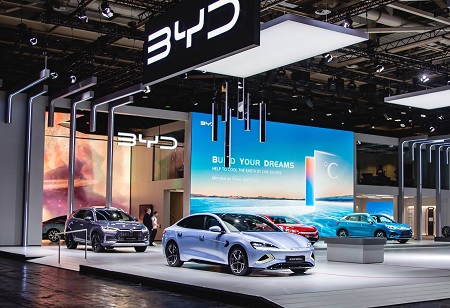
China's BYD Set to Surpass Tesla as Top Global BEV Manufacturer

 BYD, a Chinese electric vehicle (EV) manufacturer, is poised to exceed Tesla in sales of battery electric vehicles (BEVs) this year, as indicated by a recent report. This trend underscores the evolving dynamics of the global EV market. In the second quarter, BYD's BEV sales surged nearly 21 percent year-on-year, reaching 426,039 units. Meanwhile, Tesla's deliveries during the same period decreased by 4.8 percent, totaling 443,956 vehicles.
BYD, a Chinese electric vehicle (EV) manufacturer, is poised to exceed Tesla in sales of battery electric vehicles (BEVs) this year, as indicated by a recent report. This trend underscores the evolving dynamics of the global EV market. In the second quarter, BYD's BEV sales surged nearly 21 percent year-on-year, reaching 426,039 units. Meanwhile, Tesla's deliveries during the same period decreased by 4.8 percent, totaling 443,956 vehicles.
In the past year, BYD's total production, encompassing both battery-electric and hybrid vehicles, surpassed 3 million units, continuing to outpace Tesla's production of 1.84 million cars for the second consecutive year. BYD manufactured 1.6 million battery-electric passenger vehicles and 1.4 million hybrids, while Tesla maintained its leadership in the production of battery-electric vehicles alone.
However, BYD lost its position as the top EV vendor to Tesla in the first quarter. Despite this, Counterpoint Research emphasized that China continues to be a dominant force in the BEV market, with BYD at the forefront. Chinese BEV sales are projected to be four times those of North America in 2024, with China maintaining over 50 percent of the global BEV market share until 2027. By 2030, Chinese BEV sales are expected to exceed the combined sales of North America and Europe.
In light of the growing impact of Chinese EVs, the European Union has introduced new tariffs on manufacturers from China to safeguard its own EV industry. BYD is expected to face a 17.4 percent tariff, SAIC a 38.1 percent duty, and Geely an additional 20 percent duty on top of the existing 10 percent duty applied to imported EVs. These provisional tariffs are scheduled to take effect from July 4, pending ongoing discussions with Chinese authorities aimed at finding a resolution.
The European Union aims to establish fair competition for its EV manufacturers through the introduction of new tariffs intended to address the challenge posed by lower-priced Chinese imports. Liz Lee, associate director at Counterpoint Research, speculated that these tariffs could prompt Chinese automakers to prioritize emerging markets such as the Middle East and Africa, Latin America, Southeast Asia, and Australia and New Zealand.
The global market expects electric vehicle (EV) sales to reach 10 million units in 2024, coinciding with the ongoing decline of internal combustion engine vehicles. This expansion is underpinned by initiatives aimed at improving the cost-effectiveness and affordability of EVs and their batteries.

